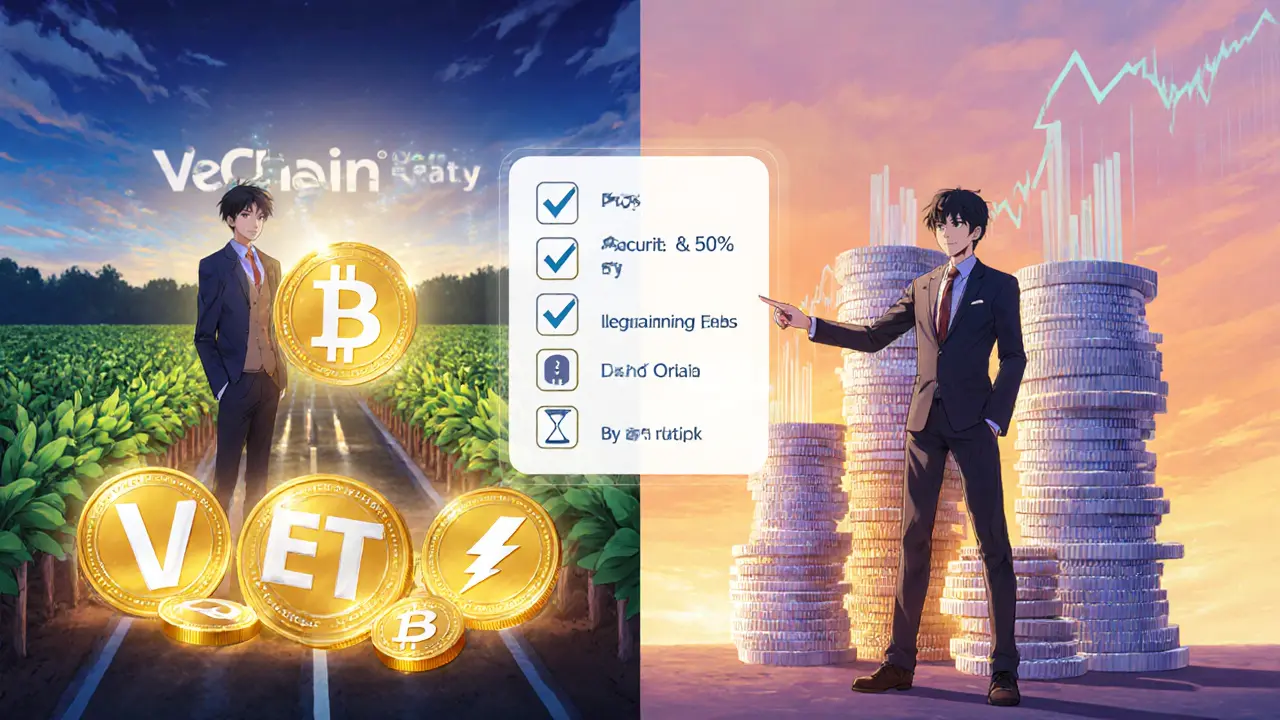OceanEx Fee Calculator
Your Estimated Fees
Tip: Join the OCE Club to reduce your fees by up to 90% with more OCE holdings!
When exploring crypto brokers, OceanEx is a centralized cryptocurrency exchange launched in 2018 that focuses on AI‑powered security and deep integration with the VeChain ecosystem. If you’ve been wondering whether the platform lives up to its hype, this review breaks down the most important aspects - from security fundamentals to fee structures and real‑world liquidity. Below you’ll find a quick snapshot, detailed analysis, and a handy comparison with two leading rivals.
Quick Take (TL;DR)
- AI‑driven security and Tier‑1 regulation give OceanEx a solid safety backbone.
- Only ~20 cryptocurrencies are available, which limits diversification.
- Fees drop to near‑zero for OCE‑Club members, but standard withdrawal fees are higher than most big exchanges.
- 24‑hour trading volume sits under $100million, far below Binance’s $30billion.
- Staking via Crypto Farm promises up to 50% APY, but the token’s utility remains niche.
Platform Overview
OceanEx positions itself as an AI‑Powered Security platform. Its claim is that machine‑learning algorithms constantly monitor traffic, detect anomalies, and block attacks before they reach user wallets. The exchange is registered in the Cayman Islands, with operational hubs in the USA, Luxembourg, Singapore, and China. For Canadian traders, the platform holds Tier‑1 regulatory approval in Quebec and Newfoundland & Labrador, which is relatively rare among niche exchanges.
Security Features
Security is where OceanEx shines. It employs bank‑level SSL encryption, cold‑wallet storage for the majority of assets, and mandatory two‑factor authentication (2FA). The platform has never reported a successful hack, and it earned a 9.75/10 safety rating from Traders Union. However, there is no investor protection fund and facial‑recognition verification is missing, which some larger exchanges now offer as an extra layer.
Trading Options and Asset Coverage
At the time of writing, OceanEx lists roughly 20 crypto pairs, primarily anchored to USDT, BTC, and VeChain (VET). Major coins like Bitcoin and Ethereum are present, but many popular altcoins (e.g., Solana, Cardano) are absent. The exchange supports limit and market orders, plus an API for algorithmic traders. Institutional users can access an over‑the‑counter (OTC) desk for large block trades.
Fees and the OCE Token Ecosystem
Fees are tiered. Regular users pay a 0.2% maker fee and a 0.3% taker fee. Holding the native OCE token unlocks discounts, and joining the OCE Club can shave fees by up to 90%. Withdrawal fees, however, remain on the higher side - especially for assets outside the VET ecosystem - and users have reported slower processing times.
The OCE token also powers the Crypto Farm staking service, which advertises up to 50% APY on OCE holdings. While the return looks attractive, staking concentration can increase market risk if OCE price drops sharply.

Liquidity and Trading Volume
Liquidity is OceanEx’s Achilles’ heel. According to CoinMarketCap data, the 24‑hour volume hovered around $95million in late 2024, a modest increase from $38million in 2019 but still dwarfed by industry leaders. Low volume can lead to slippage on larger orders and limited depth on niche pairs. The platform’s focus on VeChain gives it a unique niche, yet it also ties its growth to the adoption rate of the VeChain Thor blockchain.
User Experience, Support, and Geographic Limits
Mobile apps for iOS and Android receive consistent praise for clean design and responsive charts. The web interface mirrors the mobile layout, making it easy for new traders to switch devices. Customer support operates 24/7 via live chat, ticketing, and an extensive help center. Still, the exchange blocks users from 29 countries - including the United States, China, and Iran - limiting its global reach.
Pros & Cons Summary
- Pros:
- Strong AI‑driven security and Tier‑1 regulation in Canadian provinces.
- Fee discounts up to 90% for OCE holders.
- User‑friendly mobile apps.
- Crypto Farm staking with high advertised APY.
- Cons:
- Limited cryptocurrency selection (≈20 assets).
- Low trading volume, leading to potential slippage.
- Higher withdrawal fees and occasional delays.
- Geographic restrictions on 29 jurisdictions.
How OceanEx Stacks Up Against Bigger Exchanges
| Feature | OceanEx | Binance | KuCoin |
|---|---|---|---|
| Registered jurisdiction | Cayman Islands (Tier‑1 Canada) | Cayman Islands | Seychelles |
| Crypto pairs | ~20 (VET‑centric) | ≈6,000 | ≈1,200 |
| 24‑h volume (USD) | ≈$95M | ≈$30B | ≈$2B |
| Standard maker/taker fees | 0.20% / 0.30% | 0.10% / 0.10% | 0.10% / 0.10% |
| Fee discount with native token | Up to 90% (OCE Club) | Up to 25% (BNB) | Up to 20% (KCS) |
| Regulatory status in Canada | Licensed in QC & NL | Unlicensed, operates under global licence | Unlicensed |
| Security highlights | AI‑powered monitoring, cold wallets, 2FA | SAFU fund, hardware‑level security | Cold storage, 2FA |
Is OceanEx Right for You?
If you’re a trader who values deep VeChain integration, wants to cut fees with OCE, and prefers an exchange with Canadian regulatory backing, OceanEx can be a solid niche choice. However, if you need a broad range of assets, high liquidity for large orders, or live in one of the blocked regions, a larger platform like Binance or KuCoin will likely serve you better.
Next Steps & Troubleshooting Tips
- Sign up using your email, complete KYC (required for Canadian users), and enable 2FA.
- Deposit either fiat via Simplex/Banxa or crypto directly to your OceanEx wallet.
- Buy a small amount of OCE to test fee reductions before committing larger capital.
- If you encounter withdrawal delays, open a support ticket with transaction hash and screenshot your withdrawal request.
- Consider using the OTC desk for trades exceeding $100k to avoid market impact.

Frequently Asked Questions
Is OceanEx safe for storing large amounts of crypto?
OceanEx uses cold‑wallet storage for the majority of funds, employs AI‑driven threat detection, and has never suffered a successful hack. While the security setup is strong, the exchange does not offer an insurance fund, so large holders should consider using a personal hardware wallet for long‑term storage.
How does the OCE token reduce my trading fees?
Holding OCE gives you access to the OCE Club, where fee discounts range from 30% up to 90% depending on the amount of OCE you stake. The discount applies automatically at checkout, and you can monitor your tier in the account dashboard.
Can I trade non‑VeChain tokens on OceanEx?
Yes, but the selection is limited to about 20 assets, mainly Bitcoin, Ethereum, and a handful of VeChain‑related tokens. If you need broader exposure to DeFi or newer Layer‑1 projects, you’ll need a different exchange.
What are the withdrawal fees compared to major exchanges?
Withdrawal fees on OceanEx are generally higher than Binance or KuCoin, especially for assets outside the VET ecosystem. For example, Bitcoin withdrawals cost about 0.0008BTC, whereas Binance charges 0.0005BTC. OCE Club members receive a modest discount on these fees.
Is there a demo or test account available?
No, OceanEx does not currently offer a demo or paper‑trading environment. New users need to fund a real account to start trading.

Prince Chaudhary
November 18, 2024 AT 00:10OceanEx’s AI‑driven security model is a solid foundation for traders who value safety. The tiered fee structure rewards holding OCE, which can be a good incentive for long‑term users. However, the limited asset list means you’ll need to diversify elsewhere. For newcomers, the clean mobile app makes onboarding straightforward. Keep an eye on withdrawal fees, as they can add up over time.
John Kinh
November 19, 2024 AT 17:50Another overhyped review, same old spiel 🙄
Jayne McCann
November 21, 2024 AT 11:30The security sounds impressive but the low volume worries me. I’d rather use a bigger exchange with deeper order books. The OCE token discounts are nice, yet they won’t fix slippage issues.
Richard Herman
November 23, 2024 AT 05:10While OceanEx offers a niche for VeChain fans, the broader market may find the limited pair selection restrictive. Its Canadian licensing does add a layer of trust, which is a plus for North American users. The mobile UI is user‑friendly, and the 24/7 support helps resolve issues quickly.
Parker Dixon
November 24, 2024 AT 22:50OceanEx positions itself as a security‑first exchange, and the AI‑monitoring system does provide a tangible edge over many smaller platforms. In practice, the cold‑wallet storage of the majority of funds means that a breach would have to bypass multiple layers, which is reassuring for anyone holding sizable positions. The tier‑1 regulatory approval in Quebec and Newfoundland & Labrador is relatively rare and signals that the platform has passed stringent compliance checks. That said, the absence of an investor protection fund means you’re still relying on the exchange’s internal risk management. The fee structure is attractive for OCE holders; a 90 % discount can effectively bring maker fees down to near‑zero, which benefits high‑frequency traders. For casual users, however, the standard 0.2 %/0.3 % maker‑taker rates are comparable to many mid‑tier exchanges and not exceptionally low. Liquidity remains the Achilles’ heel – with a daily volume under $100 million, large orders can experience noticeable slippage, especially on the less‑traded VET pairs. The limited catalog of roughly 20 assets forces traders to look elsewhere for exposure to newer DeFi projects or popular altcoins like Solana and Cardano. On the bright side, the mobile apps are well‑designed, offering real‑time charts and quick order entry, which can be a decisive factor for on‑the‑go trading. Customer support’s 24/7 live chat is responsive, though ticket resolution can sometimes take a day or two during peak times. Withdrawal fees, particularly for Bitcoin, sit at 0.0008 BTC, which is higher than the sub‑0.0005 BTC rates seen on giant exchanges, and occasional delays have been reported. The Crypto Farm staking program promises up to 50 % APY on OCE, but such high yields often come with increased risk if the token price falters. Overall, OceanEx may be a solid choice for traders who prioritize security, appreciate Canadian regulatory backing, and hold enough OCE to unlock fee discounts. If you need deep liquidity, a broad asset selection, or operate from a blocked jurisdiction, you’ll likely find a better fit elsewhere. Consider testing the platform with a small deposit first to evaluate its performance in real market conditions.
Stefano Benny
November 26, 2024 AT 16:30Even with the AI guardrails, the actual on‑chain risk hasn't changed – you still face smart‑contract vulnerabilities and market manipulation vectors 😅
Bobby Ferew
November 28, 2024 AT 10:10The review glosses over the fact that high OCE discounts only help whales, leaving retail traders with the same fee burden while still coping with subpar liquidity.
celester Johnson
November 30, 2024 AT 03:50When the platform markets itself as user‑centric, it often masks the underlying power dynamics that favor token holders with deep pockets.
Mark Camden
December 1, 2024 AT 21:30It is imperative for the community to recognize that an exchange lacking a comprehensive insurance fund cannot be deemed fully trustworthy, regardless of its regulatory veneer.
Evie View
December 3, 2024 AT 15:10Trust is built on transparency, not just licences – the higher withdrawal fees alone breach that principle.
Sidharth Praveen
December 5, 2024 AT 08:50For those who appreciate a focused ecosystem, OceanEx’s VeChain integration can actually simplify trading strategies and reduce cross‑chain complexities.
Sophie Sturdevant
December 7, 2024 AT 02:30But remember, over‑reliance on a single blockchain can expose you to systemic risks if that chain experiences congestion or a protocol downgrade.
Somesh Nikam
December 8, 2024 AT 20:10The mobile app’s intuitive design really helps beginners navigate order types without feeling overwhelmed. 👍
Jan B.
December 10, 2024 AT 13:50Exactly, a clean UI paired with clear fee breakdowns makes the learning curve much gentler.
emmanuel omari
December 12, 2024 AT 07:30From a regional perspective, it’s crucial to support exchanges that maintain strong ties to global financial standards while also championing local technological advancement.
Andy Cox
December 14, 2024 AT 01:10yeah the blend of global compliance and local focus can boost confidence for users in emerging markets.